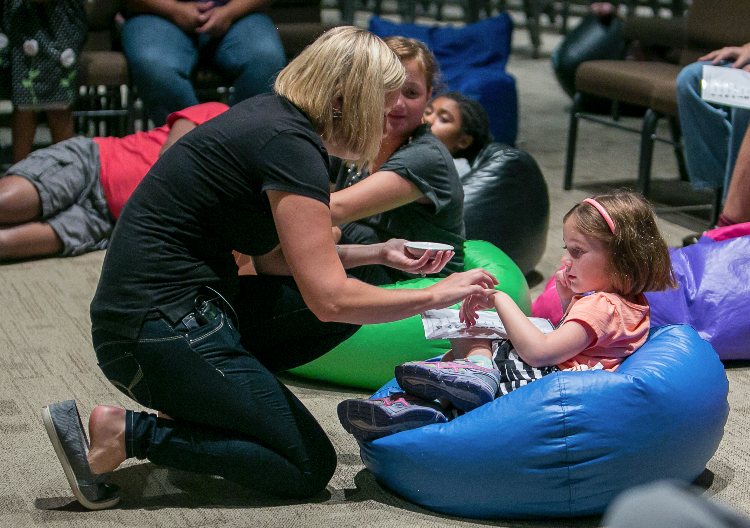
Melissa Guthrie was a new mother of two the first time she was made to feel unwelcome in a church. She and her then-wife had taken in two foster children. The younger, a 2-year-old, had severe developmental disabilities that made it impossible for him to sit quietly through a traditional service.
“We were encouraged to leave the church because Tommy was disruptive,” said Guthrie ’03. “Until you get to know our family, you don’t know why Tommy is screaming or why he is walking back and forth during the service.”Between parenting, working, and studying—Guthrie had just begun the Master of Divinity program at Wake Forest University’s School of Divinity when the kids came to live with her in 2008—there was little time to find a suitable place to worship, if one even existed. Instead, she turned her studies toward theology and disability and began seriously considering an idea that had taken root several years earlier. Planting the seed Guthrie first learned about Teach for America—which places teachers in high-needs schools—while studying at Wartburg West. She found a permanent placement with the organization following her graduation.
“Teach for America introduced me to groups of people who find themselves on the margins, specifically the students who didn’t have the same resources I did growing up,” she said. “I was teaching a lot of at-risk youth who generally felt like they weren’t wanted, and I wanted nothing more than to start something that would salvage the gifts of these individuals who were overlooked to allow beautiful things to grow.”From those experiences and her deep desire to join a faith community that would accept families like hers, Salvage Garden was born. Guthrie launched the nonprofit in Greensboro, N.C., in 2012 with a monthly sensory-worship service, The Banquet. The fast-paced, 45-minute service follows a traditional liturgy, but with a twist. Each service includes a meet-and-greet, a drama for children, a brief message, and time for reflection. Prayer stations engage all five senses and offer interactive, tangible ways for all to connect with the message. Guthrie worked with speech and occupational therapists to develop the activities.
“We use manipulatives, instruments, touch, and movement to worship and build community,” Guthrie said. “It’s nothing profound, just simple ways we can embody the stories and the things we want to teach. “Each element of the service lasts about three minutes. If we are singing, and you are nonverbal, you can participate by hearing the music,” she continued. “But you also know that in a few minutes we will be on to the next piece that might be able to engage you more.”Even the blessing is done a little differently, with a cross drawn on the hand using an edible substance, allowing those who are blind or deaf to connect with the worship community. The final piece is one of Guthrie’s favorites. Every member of the congregation is given an instrument and asked to share in a “joyful noise.”
“It is most definitely a noise. It looks like organized chaos, and it is beautiful,” she said.Widening the embrace The Banquet—now offered twice monthly—has grown into a gathering place for anyone who wishes to worship in a slightly offbeat way. The “ecumenical but not quite interfaith” service attracts families looking for an alternative way to worship and others who have felt excluded from a traditional church. That Guthrie has managed to grow Salvage Garden and bring together an eclectic mix does not come as a surprise to the Rev. Ramona Bouzard, the Herbert and Cora Moehlmann Chaplaincy Endowed Chair and dean of the chapel at Wartburg.
“She just has a spirit about her that nourishes and quietly leads and encourages people wherever she is,” Bouzard said. “She is such a great witness to the faith in terms of that radical hospitality and not in an esoteric or intellectual way, but in that concrete part of daily living.”Today, Salvage Garden also includes SibStars—a support group for siblings of special needs children—and an outreach and education component to encourage and facilitate conversations about ways traditional churches can widen their embrace.
“Churches don’t feel like it is an immediate need to have the conversation or to re-imagine ways they can worship together. But they won’t be pressed with that need unless they begin to open their doors intentionally,” Guthrie said.Though First Christian Church, where Guthrie works part time, has accepted her family—which includes Tommy (now 10), 14- year-old Stephanie, and fiancée Leah Loy—it is still difficult for them to attend a traditional Sunday morning service. The Salvage Garden leadership team, with Guthrie at the helm, is committed to the continued fight for acceptance.
“I really like dreaming, and I get caught up in that,” she said. “I want Salvage Garden to move beyond the reputation of worship for people with disabilities, because we all have so much more in common than we realize. There will always be a need for education and training for embracing one another’s differences, whether it is in churches, the workplace, or on school campuses.”
